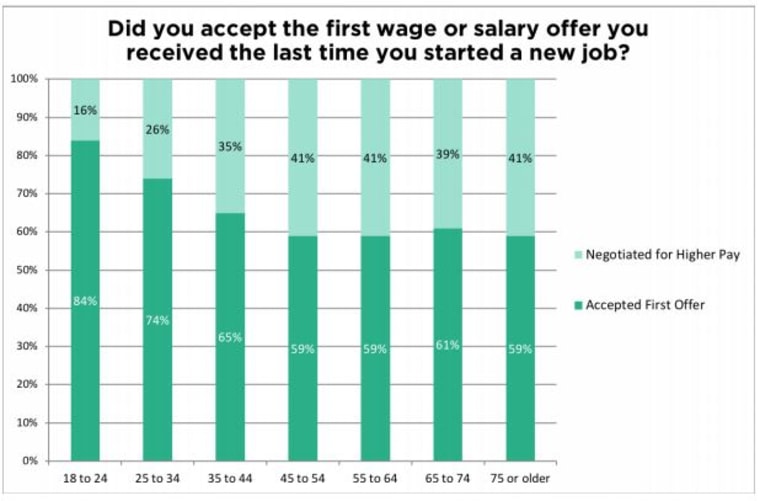Job seekers are suffering from a crisis of confidence.
The competition for talent has never been hotter, unemployment stands at 3.7 percent — the lowest rate in more than a decade — but many job seekers, a new survey finds, are still afraid of pushing back on the terms of an offer. That could end up costing employees hundreds of thousands of dollars over the course of a career.
Sixty-four percent of job hunters accept the first salary figure quoted to them. While the most likely group to make this blunder is younger, inexperienced first-time job seekers, they aren't alone. Almost 60 percent of experienced workers age 45 to 54 also admit that they didn't negotiate for higher pay either, according to a new survey of 50,000 Americans conducted by online job hub ZipRecruiter.

Accepting that first offer shortchanges the value of your talents. Job site Glassdoor discovered, through analyzing its user salary database last year, that the average U.S. employee was underpaid by $7,528 or 13.3 percent. And a study published in the Journal of Organizational Behavior found that those who ask for a wage increase boost their starting salaries by $5,000, on average.
Consider that all cost-of-living raises and future promotions will be based on that starting sum, and it becomes clear that it's not just $5,000 you're missing out on.
Because of this compounding effect, a successful negotiation even for a small annual increase, can be significant. For instance, someone who negotiated their salary up from $40,000 to $45,000 and enjoyed an annualized rate of growth of 5 percent over a 45-year career would earn about $750,000 more during their lifetime than if they'd stuck with that first offer, according to calculations conducted by ZipRecruiter.
Oddly enough, financial pressure is often what holds workers back from asking. Four in 10 job seekers say money worries led them to feel like they had to accept the first job offer they received. Fears that attempting to negotiate will cause an employer to view them negatively or rescind the offer altogether further fuel such feelings.
"It is very unlikely negotiating will lead to an offer disappearing. Most employers say that when a candidate negotiates, it conveys confidence in their own abilities and in their sense of worth," Julia Pollak, ZipRecruiter's labor economist, tells CNBC Make It. "Of course, requests need to be reasonable and should have a solid reason behind them. Employers will be far more likely to accept if you can make a case for why your skills are worth that price."
While there's no crystal ball to predict how a company will react to your negotiating attempts, there are plenty of tips and tricks you can follow to ensure your request for greater compensation comes across in a polite, professional manner. The most important thing to remember is that you can and should ask for more. ZipRecruiter found another common reason people failed to negotiate was simply because they didn't know they could.
Most employers say that when a candidate negotiates, it conveys confidence in their own abilities and in their sense of worth.
During the Great Recession, employers held most of the leverage in hiring conversations, but job seekers now don't just have to take or leave an offer as it is, says Pollak. Job openings currently exceed unemployed job seekers by more than one million, putting job seekers in a much stronger bargaining position.
To win over the best talent, organizations need to be attractive, and salary is one of the clearest ways to snag the best recruit. After all, 40 percent of those seeking a new job were doing so because they were unhappy with their compensation package.
"Job seekers have more leverage than they understand or are aware of," says Pollak.
So next time the phone rings with a job offer, go ahead and ask for a little more.
MORE FROM BETTER
- 4 easy social media updates that will give your career a boost
- How to ask for a raise (and get one)
- A better way to deal with those constant interruptions
- Want to do a better job? This expert says you should work less
Want more tips like these? NBC News BETTER is obsessed with finding easier, healthier and smarter ways to live. Sign up for our newsletter and follow us on Facebook, Twitter and Instagram.


